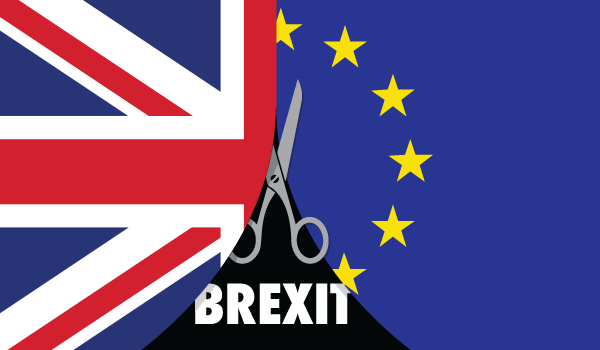
Jerry White, now retired, was a solicitor for 33 years, specialising in criminal law. He has also worked as a banker in Germany, a teacher in Spain and as a volunteer for environmental charities in Guatemala and Ecuador.
Now that the European Parliament elections and the Peterborough by-election are over, the Brexit Party has to decide what, in addition to leaving the EU without a withdrawal treaty, it is for and against. It has to draw up a set of concrete policies and eventually a manifesto. It is a moment of great danger and great opportunity for the Party.
When deciding on policies, it surely is logical for the Party to consider first and foremost what were the driving forces behind the vote for Brexit and both which social/geographic/economic groups support Brexit and which could be persuaded to the Brexit Party in the future.
It is fashionable among the chattering classes to argue that the Brexit vote was driven by the economically left behind, that the consequences of the 2008 financial crash (austerity cuts to central and local government, NHS not growing as rapidly as it otherwise might, benefit freezes or below inflation rises, public sector pay caps, stagnation in or falls in private sector wages, housing, share and other asset value rises caused by quantitative easing leading to greater asset value inequality), coupled with a growing disenchantment with our political representatives caused by scandals such as parliamentary expenses, led the not so well-off to vote against the status quo.
I would argue that, although such economic disenchantment makes people more inclined to question the status quo, the more fundamental cause of Brexit is cultural rather than economic. It is a reaction against the tyranny of political correctness. It has its roots in developments that started well before 2008, albeit that an extreme jolt such as 2008 tends to concentrate people’s minds on the question of what exactly is going wrong around them.
Brexit voters tend to have an emotional attachment to our country and a belief that the nation state is the best way to run our affairs democratically, responsively and harmoniously. They believe that the primary duty of our politicians is to our nation’s citizens and lawful residents, that we should be free to speak our minds as long as we do not encourage or incite violence against others, that the majority view should hold sway as long as it does not trample underfoot the legitimate interests of minorities, that our taxpayers’ money should not be spent on other countries or their citizens unless there is a pressing need or unless it is in our interests to do so, that the NHS is not a free international health service, that public services and benefits should not by and large be available free to those who have just arrived in the country and therefore not contributed to them, that we should control who comes into our country and that lawful immigration should be based not on quantity but on quality, that our government should protect the law-abiding while punishing the law-breakers.
In essence, Brexit voters, and a substantial further section of the population who could be persuaded to the Brexit Party’s cause, believe that, if they see something happening which runs contrary to the above, the Parliament they elect to Westminster should, and should be able to, do something to put it right.
Political correctness, on the other hand, tells us that there are certain views we are not allowed to express, that are deemed to be so illegitimate that they will result in our being howled down, dismissed or disciplined at work, our businesses boycotted, our Twitter or Facebook accounts closed down, our promotion blocked and in a few cases a visit from the police or our arrest and detention.
Political correctness seeks to shut down any questioning of, or debate about, for example, why NHS services should be available to anyone without having to show evidence of legitimate entitlement to use them; or why it is almost impossible to deport EU (and extremely difficult to deport non-EU) citizens who have committed serious crimes in the UK; or whether freedom of movement is really an unalloyed success given that so many unskilled EU citizens receive in the UK more in benefits than they pay in tax while receiving equal access to public services that they have not contributed to; or whether net immigration of 1/3 million each year is really sustainable; or whether we would have to build so much new housing on what is left of our green environment if we had an immigration policy based on quality rather than quantity; or why we should be bound by the consequences of either Mrs Merkel’s opening of the borders in 2015 to over a million illegal immigrants or the EU’s encouragement and facilitation of a ferry service for illegal immigration from the North African coast to Southern Europe.
There has been a growing realisation, and consequent frustration, that the Parliament we elect, our government and our courts are unable in most cases of perceived unfairness or abuse to do anything to put things right, whether because of EU obligations or because of other international, multilateral obligations and organisations our governments have committed us to, such as UN refugee conventions, European Convention on Human Rights, the International Criminal Court. In some cases our Parliament, government and courts hide behind these international obligations and organisations as an excuse for inaction. It is an attempt by the politically correct to fix the rules of the game in their favour in perpetuity but it should come as no surprise that it has built up a pressure cooker effect which has resulted in the result of the referendum and the emergence of the Brexit Party.
It seems broadly accurate to say that the staunchest believers in political correctness are the most implacable opponents of Brexit and therefore those whose interests and beliefs the Brexit Party should be least inclined to give consideration to when deciding on its policies. So who are these groups? In essence, they are those who form the cultural and governmental elite. They include the management layers of quangos, of universities and schools, of the arts, of central and local government, of the BBC and certain other TV companies , of NGOs/charities, of certain multinational entities such as the EU and the UN and of the police force. They also include those who are akin to political commissars embedded in organisations even though not part of management, such as equality and diversity officers, and holders of great influence over our opinions (even though again not part of management) such as journalists working for the BBC, Sky News or Channel 4 News. Many university lecturers and school teachers fall within the latter category also. Lastly, there are the self-styled ‘progressive’ nationalists of Scotland, Wales and Northern Ireland and those among environmentalist groups who are not so much green as red. In socio-economic and geographical terms, the areas most likely to be virulently anti-Brexit Party are well-off, middle-class and metropolitan with a higher than average university population.
In framing its economic policies, the Brexit Party faces great difficulty in reconciling potential supporters from both Right and Left. I personally would like to see a small state, low taxation and low public spending. Many of the Brexit Party’s less well-off supporters, who may well make up the majority, would want to see greater public spending on, for example, the NHS. There will have to be compromises. I anticipate there are ways of reducing current public spending choices, choices which would be in line with Brexit Party’s supporters’ beliefs and attitudes as referred to above, to such an extent that public spending could be significantly increased on those areas dear to its supporters’ hearts.
The first saving would result directly from Brexit itself. If we leave on 31 October this year without a withdrawal agreement, there will be no transition/implementation period and consequently the bulk of the £39 billion bill Mrs May would have committed us to would not be payable to the EU. After leaving, our current level of annual contributions to the EU would not be payable either, although I would be relaxed about a much lower sum being paid by us in exchange for participation in pan European projects useful to us and/or a good free trade agreement. The second large saving should come from a dramatic reduction in the foreign aid budget and the dissolving of the Department for International Development. Its responsibility for sending aid to alleviate the immediate effects of humanitarian disasters should be transferred to the Foreign Office and part of its budget should be transferred to the Home Office to pay for refugee camps for the processing and housing of genuine asylum seekers as close as possible to their countries of origin. The third major saving should come from a paring back of the university sector by radical changes to the student loan system (which is effectively paid for by the taxpayer due to the relatively small percentage of loans repaid by students under the current system). No government-backed loans should be made available to would-be students who fail to achieve a minimum of 3 C grades at A level nor to non- British students unless their parents could show a minimum tax contribution history in the UK nor to students applying for courses considered by the government to be of insufficient worth to the UK economy. The fourth major saving would be that neither contributory nor non-contributory benefits should any longer be available to non-British citizens unable to show a minimum tax contribution history in the UK. Fifthly, HS2 should be cancelled. It is an extremely expensive vanity project of insufficient benefit to the North.
There are other less dramatic reductions in public spending the Brexit Party should commit itself to. Anyone unable to show evidence of UK citizenship or long-term lawful residence such as indefinite leave to remain should not have access to non-emergency NHS care. Charitable status (and therefore favourable tax reductions) should be taken away from NGOs engaged in political campaigning and/or political propaganda. This would be particularly aimed at those ‘charities’ that campaign for and help illegal immigrants. National and local government funding for diversity officers, training and departments should be withdrawn. All NHS funding of treatment in respect of lifestyle choices such as transgender counselling or operations should be stopped. Although more akin to a tax than strictly a form of public spending, the funding of the BBC by a licence fee is anachronistic and subsidises politically correct propaganda. It should be abolished.
Such savings, taken together with the long-term slanting of our immigration policies away from quantity and towards quality, would allow for significant increases in public spending on those services most valued by the Brexit Party’s current and potential supporters, namely on the NHS, schools, social care, the police and improved public transport outside the South East.
In cultural terms, the Brexit Party’s policies need to push back strongly against political correctness by emphasising the fundamental importance of freedom of speech. The mere fact of someone being insulted or outraged should never be a reason for banning free expression. The criminal law needs to draw a clear line between, on the one hand, using, threatening or encouraging physical violence and, on the other, expression which is insulting, offensive, upsetting, distressing or pulls no punches in the strength of its criticism. The latter should be ‘policed’ by civic society, shame, manners, criticism, ridicule but never by the police themselves and nor by censorship. We should redefine current laws in relation to ‘hate speech’ in a much more limited way and so-called ‘hate incidents’ (which are not even crimes) should no longer be either investigated or recorded by the police. Pressure should be put by a putative Brexit Party government on social media companies to permit freedom of expression, not to shut it down except where it crosses the line into what is prohibited by the criminal law. It should be clear, for example, that we are free to criticize all religions and their beliefs/practices. We should, therefore, resist the concept of Islamophobia as inimical to freedom of speech.
The vast majority of policy-setting and opinion-influencing positions in the public sector, BBC and quangos in the UK are currently filled by drivers of political correctness or those so cowed by it that they do its bidding. Brexit Party policy should be to use all levers at its disposal to halt and reverse this tendency by blocking the appointment of the politically correct to such bodies. Independence of thought and critical thinking should be welcome in such appointments. We do not simply want to appoint unqualified yes-men and time-servers but it needs to be clear that political correctness will be an impediment rather than an advantage/necessary precondition to being appointed to such positions.
The Brexit Party’s cultural policies will inevitably face the criticism that they are an attempt to turn the clock back or resist ‘progress’. The Party should do its best to draw the sting from this criticism without compromising on certain principles. It would, in my opinion, be wrong in principle, and an absurdly pointless own goal, to adopt policies hostile to abortion, women’s equality, civil partnerships, gay marriage. These are all social changes that are here to stay and should be welcomed. There are reactionary and threatening forces, such as fundamentalist Islam, opposed to these social changes and the Brexit Party must be opposing such forces, not allying itself with them. However, the extremist campaigners for political correctness want to go much further than those changes just referred to. I have mentioned above where we should draw the line in relation to so-called ‘hate speech’ and also the need to withdraw funding for the all-pervasive and wasteful political commissars operating under the banner of diversity officers. In relation to the transgender issue the Brexit party should effectively draw the line between LGB and T. In a free society any adult should be free to change sex at his/her own expense (as opposed to everyone else’s expense by receiving treatment on the NHS). However, legal conditions should have to be met if that person wishes his/her change to be recognised by official bodies and if s/he wishes to use facilities (prisons, changing rooms, domestic violence refuges) reserved for the opposite sex. Such conditions should require a minimum period of living as a person of the opposite sex, surgery, hormone treatment. It should not be lawful to provide hormone treatment or surgery, with a view to changing sex, to a minor.
It is essential that the Brexit Party recognise that, as currently framed, many international treaties to which the UK is a signatory together with the UK legislation that gives effect to them will prevent the implementation of those policies referred to in this article which involve our sovereignty and our ability to control who enters our country. Such treaties and legislation include the Human Rights Act, European Convention on Human Rights, EU Charter of Fundamental Rights, Convention Relating to the Status of Refugees. In relation to the Human Rights Act, we need to repeal it. To replace it with a so-called British Bill of Rights would simply substitute one massive judicial obstacle for another. The proponents of a British Bill of Rights fail even remotely to appreciate the extent to which British judges and a very large number of lawyers are part of the problem rather than part of the solution in the sense that they have bought into political correctness, the rights culture, judicial activism blocking government action and the dictatorship of minorities over the majority. The Human Rights Act and Convention on Human Rights hand enormous powers of legal interpretation to judges as they are necessarily worded in the most vague terms. They also require judges to decide on policy issues which should be the preserve of politicians who have the benefit of prior debate and civil service advice on the (financial and other) consequences and implications of such policy decisions and are answerable to electorates who may be unhappy with them. This is an area where the Brexit Party does need unashamedly to advocate for a return to a better pre-Human Rights Act past in which the British common law permitted any activity which was not specifically, clearly and expressly outlawed by Act of Parliament (or, in a very few instances, by judicial case law). In the case of pernicious international conventions, such as the Refugee Convention or the European Convention on Human Rights, a Brexit Party government would have urgently to withdraw from them. I would personally have no objection to offering to commit to a radically and tightly redrawn Refugee Convention although I would hold out no hope of an acceptable one being agreed at UN level. It might , however, be possible to agree one amongst a small number of like-minded European and Commonwealth countries.
The issue of the environment is a potential minefield for Brexit Party policies. We should be sceptical about the advisability of adopting climate change policies which would inflict substantial damage and cost on our economy but to adopt climate change denying policies would be a grave error. Public opinion appears convinced that global warming is happening due to human activity. To argue otherwise will not persuade potential supporters, not just because of the weight of scientific opinion but also because of the sheer improbability of the argument that a massively increasing world population consuming a massively increasing quantity of energy and materials is not creating global warming. So the Brexit Party should embrace renewable energy but accompanied by policies designed to achieve green change within a realistic time frame, not one driven by hysteria. In the meantime, we should seek to reduce the UK’s dependence on importing fuel from dictatorial, corrupt, malevolent regimes around the world such as Saudi Arabia, Iran or Russia and one way of achieving that is through relaxing the currently over-restrictive rules applicable to fracking. The Brexit Party also needs to be clear, in contrast to the politically correct ‘progressives’, on the primary cause of environmental destruction, namely excess population, in comparison with which global warming is relatively insignificant. More restrictive immigration policies are, amongst other things, environmentally friendly and will reduce the need for us to concrete over great swathes of our green and beautiful land.
Which brings me finally to the Brexit Party’s immigration policy. For years this country’s immigration laws have been based on quantity rather than quality. Freedom of Movement for EU citizens, and in many cases non EU citizens with residence rights or who are partners of EU citizens, is merely the most extreme example of this. Net annual immigration, excluding asylum-seekers, according to official statistics, is running at 1/3 million each year, a surely unsustainable number. The Brexit Party should limit immigration to those with the skills and education useful to this country’s economy. Unskilled immigration should be severely limited, being only available in sectors where there is an acute shortage of workers and be allowed by way of time-limited working visas, not indefinitely. There would however seem to be no compelling reason for not granting to EU citizens under the age of, say, 28 the ability to enter on 2 year work permits as we currently do to Australians. This would in itself provide substantial unskilled labour in certain sectors, notably hospitality. This should not be extended to citizens of possible future EU member states such as Albania or Turkey. Immigrants’ access to public services should be limited according to time spent and tax paid in the UK. Foreign student numbers would be limited by the non-availability of taxpayer-backed student loans but we should be generous in allowing graduates in certain subjects to remain for the purposes of post-graduation employment. Family reunification, marriage, partnership routes to immigration should be strictly limited to those who can show they can be supported indefinitely without recourse to taxpayers’ funds and those allowed to enter on such a basis should never be allowed access to public funds unless they themselves have contributed sufficiently in taxes. There should be a presumption against the granting of visas to immigrants from certain specified countries from which realistically no verifiable information such as criminal record checks will be forthcoming.
The refugee route to immigration should be reduced as far as possible to zero, with genuine refugees housed outside the UK close to their countries of origin. The criteria for acceptance as a genuine refugee should, as discussed above, be substantially tightened up. There should be a bar to claiming asylum in the case of any applicant who comes from or has passed through any country deemed by our government to be safe. Detention places for any applicant for asylum considered to be a flight risk should be made available. There should be stricter time limits for asylum decisions and appeals. Once asylum has been refused, all state support should be withdrawn. Any applicants claiming to be unaccompanied minors should be subject to X-rays, dental checks and other assessments to establish the truth of their claim in the absence of official, genuine and verifiable ID documents. The absence of official, genuine and verifiable ID documents should, in all cases, lead to a presumption against the granting of asylum. Substantial resources and political will-power should be devoted to deporting illegal immigrants including failed asylum seekers and over-stayers. It must be made plain to countries with a track record of failure to cooperate in providing travel documents or information necessary to the identification of their nationals that this will result in negative consequences for our bilateral relations and the readiness to grant visas to their citizens. We must ensure the deportation of all foreign nationals sentenced to imprisonment or convicted of more than one imprisonable offence in the UK.
Lastly, what should the Brexit Party’s policy be in respect of EU nationals who enter the UK before 31/10/19 ? It seems to contradict the reasons for the Brexit vote to say that all who enter before our withdrawal can claim settled status (and with it the subsequent ability to claim UK citizenship, benefits etc). The ability to claim settled status in respect of residence before 31/10/19 should not be granted to those EU citizens with criminal records for imprisonable offences, to those claiming out of work benefits, nor to those whose history of claiming other benefits outweighs the tax they have contributed.





